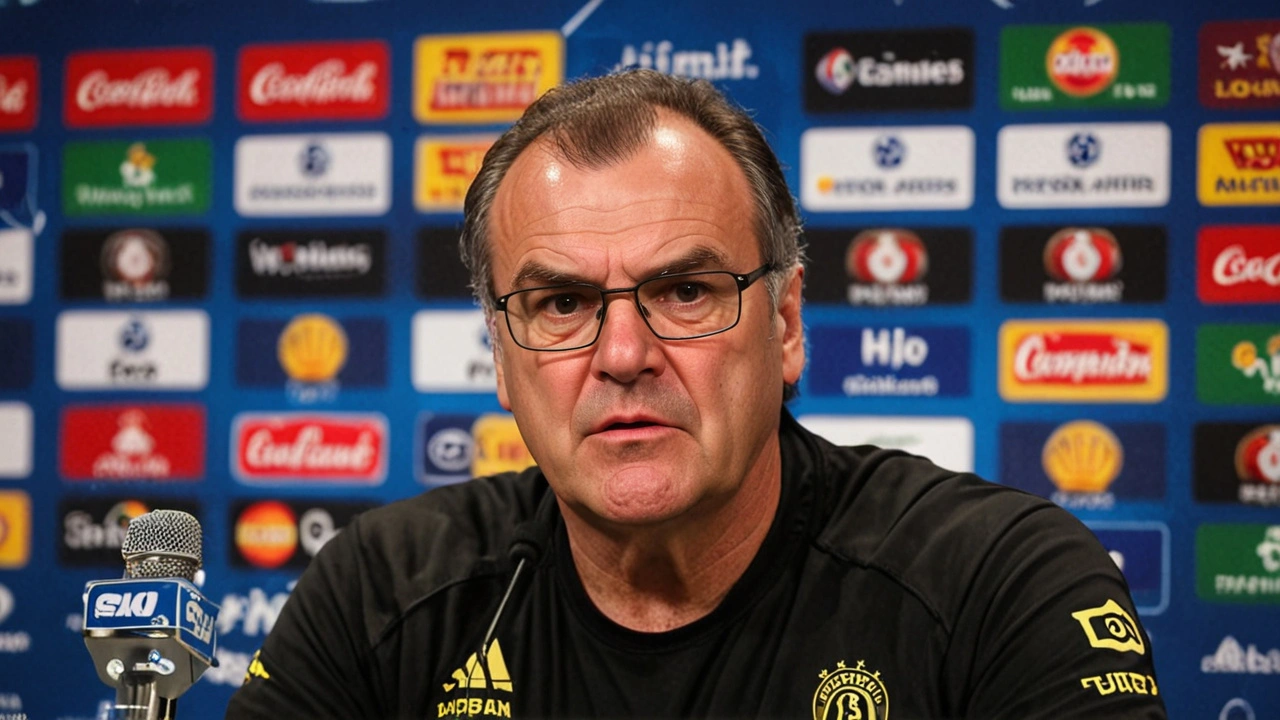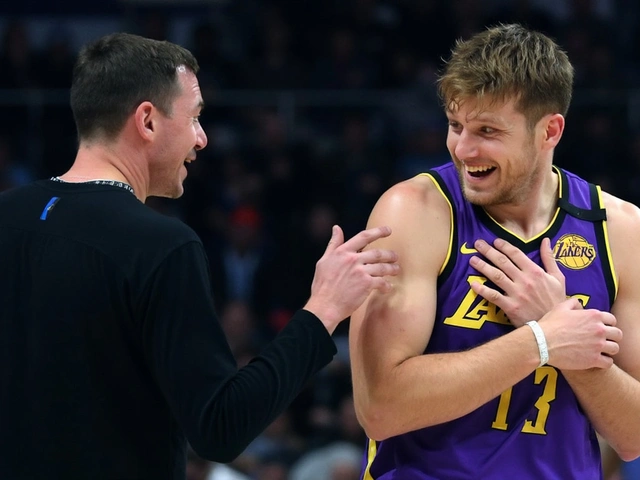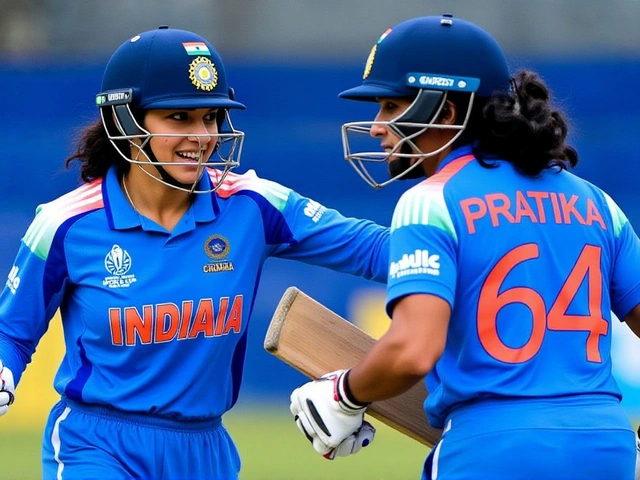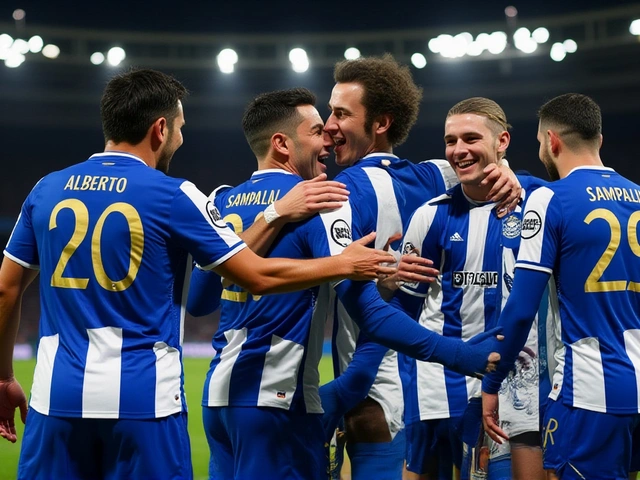Uruguay's head coach Marcelo Bielsa has unapologetically voiced his frustration over the safety lapses that led to a violent incident during the Copa America semifinal against Colombia. The tensions peaked when Liverpool striker Darwin Nunez and his teammates charged into the stands to defend their families from aggressive Colombian supporters. The melee saw Nunez taking punches, sparking outrage from Bielsa and a heated debate about security protocols at major sporting events.
Bielsa did not mince words as he chastised US Soccer and the CONMEBOL federation for failing to provide adequate security. The seasoned coach labeled the oversight as gross negligence, insisting that the players’ reactions were purely instinctual. 'What do you expect? Any human being would act the same way if their loved ones were in danger,' Bielsa asserted during a post-match press conference. The coach’s remarks underscore the emotional intensity surrounding the incident, which has since garnered widespread attention.
Uruguay captain Jose Maria Gimenez echoed Bielsa's sentiments, expressing his own disappointment with the lack of a visible police presence at the stadium. 'We felt completely unprotected,' he said. 'It's a disgrace that in such a significant tournament, our families weren't safe.' His criticism highlights a broader issue of fan violence and the measures that should be in place to prevent it.
The altercation is now under investigation, with potential disciplinary actions looming for the players involved. Bielsa has been outspoken in defending his squad, stressing that their paramount concern was the safety of their families. The coach’s defiance is notable, especially as it comes ahead of Uruguay's third-place match against Canada, adding another layer of complexity to an already tense situation.
Aside from the immediate fallout, Bielsa also took aim at certain journalists, accusing them of exacerbating the situation through sensationalist reporting. He suggested that the media played a role in inflaming emotions, leading to the chaos that unfolded. 'They are not just observers; some of them are instigators,' the coach remarked pointedly. His comments reflect a growing frustration with how the incident has been portrayed in the public eye.
The episode raises serious questions about tournament organization and the responsibilities of both local authorities and governing bodies to ensure the safety of players and their families. Many are now calling for stricter security measures, including better crowd control and more rigorous checks on fan behavior.
Meanwhile, as Uruguay prepares for their upcoming match against Canada, the players are making it clear that their primary focus remains on protecting their loved ones. The solidarity within the team is palpable, and the episode has inadvertently brought the squad closer together. In the words of Bielsa, 'We stand united, come what may.' The sentiment is likely to resonate with fans who have seen their heroes risk personal safety for the sake of family.
This incident, while alarming, underscores the deep emotional bonds athletes have with their families and the lengths to which they will go to protect them. It is a stark reminder of the human element that often gets overshadowed in high-stakes sports events. As the investigation unfolds, the football community will be watching closely to see how authorities address these critical security concerns.
Security Concerns at Major Sporting Events
Fan violence is not a new issue, but incidents like the one involving Darwin Nunez and his Uruguay teammates bring the matter into sharp focus. Whether it's on the football pitch, in basketball arenas, or other sports venues, the safety of athletes and their families remains a pressing concern. The recent turmoil at the Copa America has reignited discussions on how best to safeguard against such occurrences.
Traditionally, security measures have included routine checks and a substantial police presence. However, the chaotic scene witnessed during the Uruguay-Colombia match suggests that such measures were either inadequate or poorly executed. Fans infiltrating secure areas and engaging in violent behavior highlights a severe lapse in crowd control, calling for a comprehensive review of protocols.
The Role of Tournament Organizers
Tournament organizers, such as CONMEBOL, face scrutiny over their planning and execution of security arrangements. Critics argue that the organization should reassess their protocols to prevent similar incidents. This might involve collaborating more closely with local authorities and investing in advanced crowd management technologies.
Moreover, organizers must establish transparent procedures for responding to emergencies, ensuring that there are sufficient resources to handle any disruptions quickly and efficiently. Clear communication channels between security personnel, players, and their families are essential in minimizing risks.
As the investigation continues, we'll likely see a push for higher standards of safety at future tournaments. This could result in stricter penalties for fans who engage in violent behavior, as well as more robust training for security staff.
Emotional Impact on Players
Beyond the physical dangers, incidents of fan violence have a profound emotional impact on players. For athletes, the safety of their families is paramount, and any threat to their well-being can be deeply distressing. Such events can disrupt their focus and performance, influencing the team's overall morale and cohesion.
In the case of Darwin Nunez and his teammates, the emotional toll was evident. Their response, driven by a protective instinct, demonstrates the powerful connection between athletes and their loved ones. This human side of sports is often overlooked, but it plays a crucial role in how players approach their professional lives.
Bielsa's passionate defense of his players reflects this understanding. By standing with his team, he acknowledges the complex interplay of professional obligations and personal responsibilities that athletes navigate. This holistic approach could pave the way for more empathetic handling of similar situations in the future.
A Call to Action
The Copa America incident should serve as a wake-up call for all stakeholders in the sports industry. From governing bodies to local authorities and fans themselves, there is an urgent need to address the root causes of such violence and implement effective solutions.
Fans must be educated on appropriate behavior, and strict consequences should be enforced for those who violate these standards. Authorities need to ensure that security at sports events is comprehensive and responsive, capable of protecting all attendees, including players and their families.
For their part, journalists have a responsibility to report incidents accurately and responsibly, avoiding sensationalism that can inflame tensions. By highlighting the human aspects of such events, they can foster greater understanding and compassion within the sports community.
As Uruguay looks to move past this unsettling episode, the lessons learned will hopefully lead to safer, more secure environments for everyone involved in sports. Bielsa and his players' actions, born out of a fundamental human instinct, remind us of the importance of empathy and protection in the face of adversity.







Kaviya A July 15, 2024
omg i cant believe this happened like seriously who lets fans get this close to the players families?? like wtf is wrong with security??
Supreet Grover July 16, 2024
This incident underscores a critical failure in the stakeholder ecosystem's risk mitigation framework. The absence of layered access control protocols and real-time behavioral analytics in high-density spectator zones represents a systemic vulnerability in event security architecture. Bielsa's response is not merely reactive-it's a necessary recalibration of athlete welfare as a non-negotiable KPI in tournament governance.
Saurabh Jain July 18, 2024
I've seen fan violence in India during cricket matches, but this is on another level. Players protecting their families? That's not aggression-that's instinct. No amount of tickets or banners justifies putting loved ones in harm's way. The real shame is how long it took for anyone to take this seriously.
Suman Sourav Prasad July 19, 2024
I mean, come on... people are acting like this is some kind of surprise? We've had this happen in England, in Argentina, in Brazil-everywhere. And every time, the same thing: 'Oh no, we didn't expect this!' But we DID expect it. We've seen it. We've reported it. And still, they let fans get within arm's reach of the dugout? That's not negligence-that's arrogance. And now the media is turning it into a circus? Please. The players did what any decent human would do. The real criminals are the ones who sat back and let it happen.
Nupur Anand July 19, 2024
Let’s be brutally honest: this isn’t about security gaps-it’s about the collapse of civilizational norms in the age of performative outrage. The stadium became a theater of primal tribalism, where the sacred boundary between spectator and participant dissolved into a blood-soaked soap opera. Bielsa isn’t just defending his players-he’s defending the last vestige of human dignity in a sport that’s been commodified into a grotesque carnival. The journalists? They’re not just reporting-they’re curating chaos for clicks. And the fans? They’re not supporters-they’re consumers of violence, addicted to the adrenaline of seeing their idols in peril. This isn’t football anymore. It’s gladiator economics. And we’re all paying the ticket price.
Vivek Pujari July 21, 2024
This is why we need mandatory bio-verification for all fans entering stadiums. Facial recognition + behavioral AI + real-time threat scoring. If you’ve ever been banned for yelling slurs or throwing bottles, you shouldn’t be allowed near a pitch. And the players? They’re heroes. Not because they fought-but because they chose to protect their families instead of running away. 🫡 The federation needs to be held accountable like a corporation that ignored safety protocols. This isn’t just a scandal-it’s a moral failure. And the media? They need to stop turning this into a viral moment and start demanding real change.